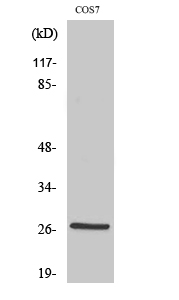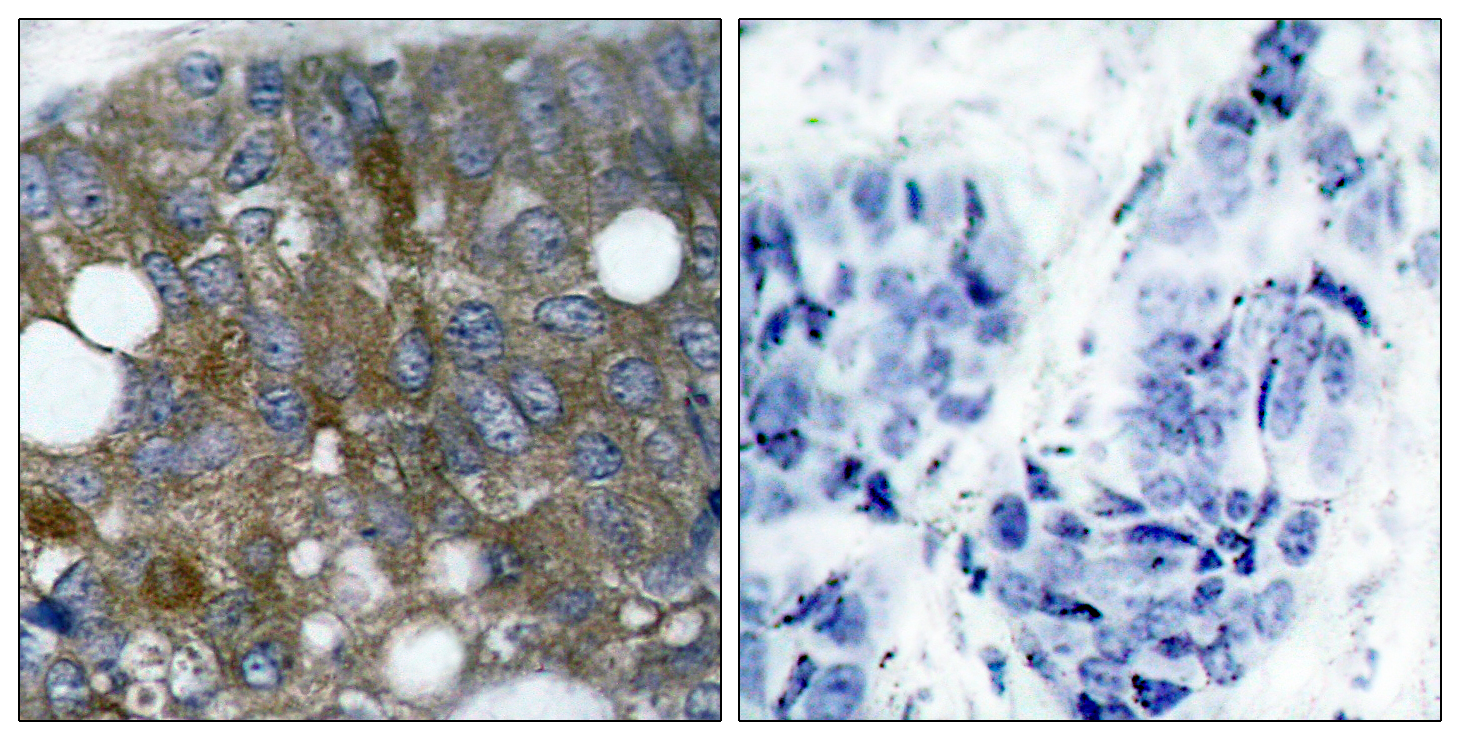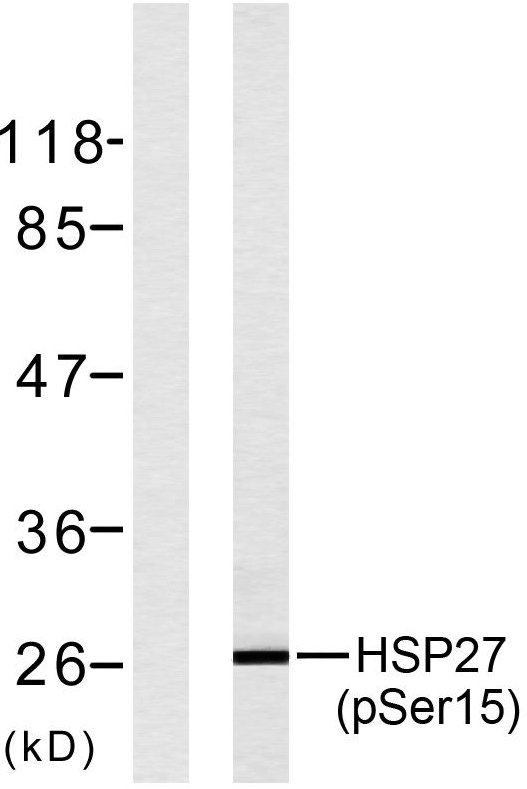HSP27 (phospho Ser15) Polyclonal Antibody
- Catalog No.:YP0134
- Applications:WB;IHC;IF;ELISA
- Reactivity:Human;Monkey
- Target:
- HSP27
- Fields:
- >>MAPK signaling pathway;>>VEGF signaling pathway;>>Amoebiasis
- Gene Name:
- HSPB1
- Protein Name:
- Heat shock protein beta-1
- Human Gene Id:
- 3315
- Human Swiss Prot No:
- P04792
- Mouse Swiss Prot No:
- P14602
- Immunogen:
- The antiserum was produced against synthesized peptide derived from human HSP27 around the phosphorylation site of Ser15. AA range:5-54
- Specificity:
- Phospho-HSP27 (S15) Polyclonal Antibody detects endogenous levels of HSP27 protein only when phosphorylated at S15.
- Formulation:
- Liquid in PBS containing 50% glycerol, 0.5% BSA and 0.02% sodium azide.
- Source:
- Polyclonal, Rabbit,IgG
- Dilution:
- WB 1:500 - 1:2000. IHC 1:100 - 1:300. ELISA: 1:20000.. IF 1:50-200
- Purification:
- The antibody was affinity-purified from rabbit antiserum by affinity-chromatography using epitope-specific immunogen.
- Concentration:
- 1 mg/ml
- Storage Stability:
- -15°C to -25°C/1 year(Do not lower than -25°C)
- Other Name:
- HSPB1;HSP27;HSP28;Heat shock protein beta-1;HspB1;28 kDa heat shock protein;Estrogen-regulated 24 kDa protein;Heat shock 27 kDa protein;HSP 27;Stress-responsive protein 27;SRP27
- Observed Band(KD):
- 26kD
- Background:
- The protein encoded by this gene is induced by environmental stress and developmental changes. The encoded protein is involved in stress resistance and actin organization and translocates from the cytoplasm to the nucleus upon stress induction. Defects in this gene are a cause of Charcot-Marie-Tooth disease type 2F (CMT2F) and distal hereditary motor neuropathy (dHMN). [provided by RefSeq, Oct 2008],
- Function:
- disease:Defects in HSPB1 are a cause of distal hereditary motor neuronopathy type 2B (HMN2B) [MIM:608634]. Distal hereditary motor neuronopathies constitute a heterogeneous group of neuromuscular disorders caused by selective impairment of motor neurons in the anterior horn of the spinal cord, without sensory deficit in the posterior horn. The overall clinical picture consists of a classical distal muscular atrophy syndrome in the legs without clinical sensory loss. The disease starts with weakness and wasting of distal muscles of the anterior tibial and peroneal compartments of the legs. Later on, weakness and atrophy may expand to the proximal muscles of the lower limbs and/or to the distal upper limbs.,disease:Defects in HSPB1 are the cause of Charcot-Marie-Tooth disease type 2F (CMT2F) [MIM:606595]. CMT2F is a form of Charcot-Marie-Tooth disease, the most common inherited disorder of
- Subcellular Location:
- Cytoplasm . Nucleus . Cytoplasm, cytoskeleton, spindle . Cytoplasmic in interphase cells. Colocalizes with mitotic spindles in mitotic cells. Translocates to the nucleus during heat shock and resides in sub-nuclear structures known as SC35 speckles or nuclear splicing speckles. .
- Expression:
- Detected in all tissues tested: skeletal muscle, heart, aorta, large intestine, small intestine, stomach, esophagus, bladder, adrenal gland, thyroid, pancreas, testis, adipose tissue, kidney, liver, spleen, cerebral cortex, blood serum and cerebrospinal fluid. Highest levels are found in the heart and in tissues composed of striated and smooth muscle.
- June 19-2018
- WESTERN IMMUNOBLOTTING PROTOCOL
- June 19-2018
- IMMUNOHISTOCHEMISTRY-PARAFFIN PROTOCOL
- June 19-2018
- IMMUNOFLUORESCENCE PROTOCOL
- September 08-2020
- FLOW-CYTOMEYRT-PROTOCOL
- May 20-2022
- Cell-Based ELISA│解您多样本WB检测之困扰
- July 13-2018
- CELL-BASED-ELISA-PROTOCOL-FOR-ACETYL-PROTEIN
- July 13-2018
- CELL-BASED-ELISA-PROTOCOL-FOR-PHOSPHO-PROTEIN
- July 13-2018
- Antibody-FAQs
- Products Images

- Western Blot analysis of various cells using Phospho-HSP27 (S15) Polyclonal Antibody

- Immunohistochemistry analysis of paraffin-embedded human breast carcinoma, using HSP27 (Phospho-Ser15) Antibody. The picture on the right is blocked with the phospho peptide.

- Western blot analysis of lysates from HeLa cells treated with UV, using HSP27 (Phospho-Ser15) Antibody. The lane on the left is blocked with the phospho peptide.



